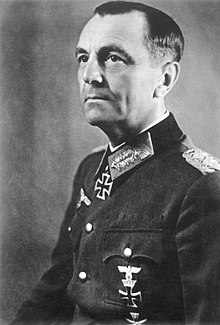
Back Friedrich Paulus Afrikaans Friedrich Paulus AN فريدريش باولوس Arabic فريدريش پولوس ARZ Fridrix Paulus Azerbaijani فریدریش پائولوس AZB Фрыдрых Вільгельм Эрнст Паўлюс Byelorussian Фрыдрых Паўлюс BE-X-OLD Фридрих Паулус Bulgarian Friedrich Paulus BS
Friedrich Paulus | |
|---|---|
 Paulus in June 1942 | |
| Birth name | Friedrich Wilhelm Ernst Paulus |
| Born | 23 September 1890 Guxhagen, Kingdom of Prussia, German Empire |
| Died | 1 February 1957 (aged 66) Dresden, East Germany |
| Allegiance | |
| Branch | |
| Years of service | 1910–45 1953–56 |
| Rank | Generalfeldmarschall |
| Commands held | Sixth Army |
| Battles/wars | World War I
|
| Awards | Knight's Cross of the Iron Cross with Oak Leaves |
| Alma mater | Marburg University |
| Spouse(s) | |
| Signature | |
Friedrich Wilhelm Ernst Paulus (23 September 1890 – 1 February 1957) was a German Generalfeldmarschall (Field marshal) during World War II who is best known for his surrender of the German 6th Army during the Battle of Stalingrad (July 1942 to February 1943). The battle ended in disaster for the Wehrmacht when Soviet forces encircled the Germans within the city, leading to the ultimate death or capture of most of the 265,000-strong 6th Army, their Axis allies, and collaborators.
Paulus fought in World War I and saw action in France and the Balkans. He was considered a promising officer; by the time World War II broke out, he had been promoted to major general. Paulus took part in the invasions of Poland and the Low Countries, after which he was named deputy chief of the German Army General Staff. In that capacity, Paulus helped plan the invasion of the Soviet Union.
In 1942, Paulus was given command of the 6th Army despite his lack of field experience. He led the drive to Stalingrad but was cut off and surrounded in the subsequent Soviet counter-offensive. Adolf Hitler prohibited attempts to break out or capitulate, and the German defense was gradually worn down. Paulus surrendered in Stalingrad on 31 January 1943,[a] the same day on which he was informed of his promotion to field marshal by Hitler. Hitler expected Paulus to take his own life,[3] repeating to his staff that there was no precedent of a German field marshal being captured alive.
While in Soviet captivity during the war, Paulus became a vocal critic of the Nazi regime and joined the Soviet-sponsored National Committee for a Free Germany. In 1953, Paulus moved to East Germany, where he worked in military history research. He lived out the rest of his life in Dresden.
- ^ Fraschka 2008, p. 8.
- ^ Beevor 1998, p. 390.
- ^ Rise and Fall of the Third Reich, Shirer, digital page 1569
Cite error: There are <ref group=lower-alpha> tags or {{efn}} templates on this page, but the references will not show without a {{reflist|group=lower-alpha}} template or {{notelist}} template (see the help page).
© MMXXIII Rich X Search. We shall prevail. All rights reserved. Rich X Search